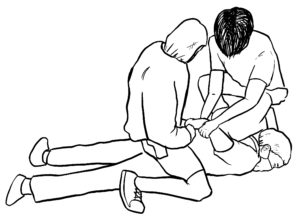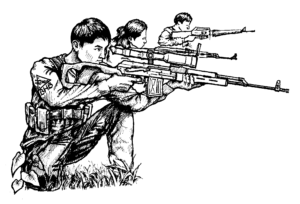Challenges as a lesbian Red fighter

When asked what she considers her best experience as a member of the New People’s Army, Ka Nica goofily shares about the time she danced with another girl in front of comrades and peasant masses. It is a big thing for her, she says, because it was the first time she felt visible not just as a Red fighter but as a lesbian in the people’s army and revolutionary movement.
“It was always a custom in those parts that after mass work, the masses and the Red fighters would hold a cultural program. A courtship dance was one of the highlights of those events, and of course, it’s traditionally a dance between a man and a woman. I almost fell off my seat when I heard my name being called on stage. As I sheepishly dragged my feet forward, the comrade who was the emcee said with some pride that I was a ‘woman with the heart of a man.’ And so another woman, a masa, was also called on stage to dance with me! I was thrilled!”
Up until then, Ka Nica says she had never been completely comfortable being an “out” lesbian in the NPA, although her pixie cut and butch demeanor almost always gave her away. “I was never really in the closet. I just didn’t feel like bringing up my gender orientation in every conversation. But that afternoon, among the gathered masses and fellow Red fighters, I felt genuinely okay with expressing who I really was.”
When dealing with the biases she has encountered as a lesbian before and even after joining the NPA, Ka Nica is quick to clarify that while there are still prejudices in the people’s army, they are nowhere as traumatizing as the kind she dealt with in bourgeois society.
She observes that while most capitalist countries give token acceptance to LGBTQ in recognizing same-sex marriages, bourgeois societies in essence are homophobic and rife with all forms of biases. “They may have made concessions with regards to marriage, but capitalism continues to victimize LGBTQ people in the workplace and in low-income communities, or with the prevalence of hate crimes and police brutality. It doesn’t make sense to uphold one of our basic rights but oppress and terrorize us in everything else.”
Ka Nica believes that what sets the national democratic revolution apart from bourgeois society’s token acceptance is not merely that the Communist Party of the Philippines allows same-sex marriage, but also that the Party and the movement genuinely strive to respect gender identity and sexual orientation as a principle in the course of waging the people’s war. “It’s the fact that there is an on-going struggle within the struggle, a cultural revolution, against all forms of biases and injustices, not just gender-based, that spells the difference,” she asserts.
 In the NPA’s daily grind and in doing mass work in communities in the countryside, Ka Nica says she witnesses the victories of this very struggle play out in small but surprising ways. “It’s when comrades appreciate gay men and lesbians who hold the line during military actions, especially defensive ones where we are taken in surprise. Or during educational discussions when you see the light of understanding in the faces of comrades and peasant masses as you explain the effects of neoliberalism to the lives of the peasantry. Even in merely being a Red fighter who’s risen above the sacrifices of Duterte’s fascist counter-revolution. That’s when they see you—a revolutionary, not just someone with a particular sexual orientation. What I learned is that the more I become a better comrade by performing my tasks, the more I become visible and champion the LGBTQ struggle.”
In the NPA’s daily grind and in doing mass work in communities in the countryside, Ka Nica says she witnesses the victories of this very struggle play out in small but surprising ways. “It’s when comrades appreciate gay men and lesbians who hold the line during military actions, especially defensive ones where we are taken in surprise. Or during educational discussions when you see the light of understanding in the faces of comrades and peasant masses as you explain the effects of neoliberalism to the lives of the peasantry. Even in merely being a Red fighter who’s risen above the sacrifices of Duterte’s fascist counter-revolution. That’s when they see you—a revolutionary, not just someone with a particular sexual orientation. What I learned is that the more I become a better comrade by performing my tasks, the more I become visible and champion the LGBTQ struggle.”
When shades of prejudices do come up, Ka Nica takes them in stride. “It’s an opportunity to explain and disabuse comrades and the masses of their biases. It’s not their fault that they have been bombarded by misrepresentations and clichésq in the mainstream media. Sometimes it’s hard and the ‘minority stress’ gets to you, but that’s what cultural revolution is about, right?” she says with a knowing smile.
Ka Nica also shares the usual misconception that being a butch lesbian like her is just a phase. “Or that I just haven’t met the right man yet, and that I could still change. I patiently explain that Marxism teaches us that change is determined by internal laws. I believe that gender orientation is an internal precept of every human being that external conditions, such as “the right man,” can do very little to change one’s attraction to others.”
“It’s also a good thing that individual references in our languages are generally gender-neutral so there’s no added stress about pronouns. I feel for members in the LGBTQ community in western countries, even in the urban centers in the Philippines, who struggle for visibility and acceptance because capitalist and bourgeois culture always presents added stress to their lives.
Now married with another woman Red fighter for almost three years, Ka Nica still remembers that long ago courtship dance with fondness. “Kinikilig pa rin ako,”* she says, laughing. It is during that moment and many others like it that she is proud she is a lesbian in the NPA and the revolutionary movement.
____
Longer version of the article published in Ang Bayan July 21, 2022 printed English edition



